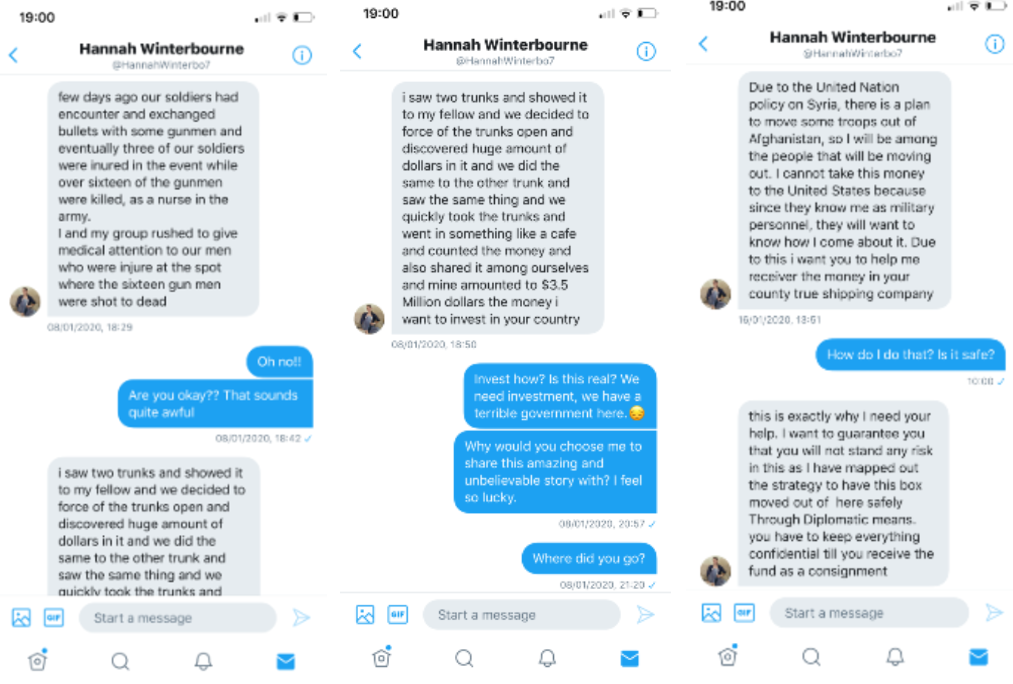Cruel con artists are impersonating trailblazing trans army officer Hannah Graf to scam victims out of cash

Captain Hannah Graf with her MBE at Buckingham Palace in 2019. (David Mirzoeff/WPA Pool/Getty Images)
“I’d love to be able to go: ‘It’s not my problem, it’s someone else who’s being scammed,'” says Hannah Graf.
“But when it’s your name, and people are coming to you, it’s hard to distance yourself from it.
“I have friends and family in my life that I know are vulnerable and might be the sort of people who fall victim to this, so it’s hard not to think that it’s the right thing to do to try and stop it.”
For the past couple of years, Hannah has repeatedly been impersonated online.
The scammers use pictures of her – which are readily available because, as the highest ranking transgender officer in the history of the British army, she has a significant public profile – to set up fake social-media accounts in her name.
Then, pretending to be a US soldier based in the Middle East, the scammers message people asking for money – often, Hannah says, saying they’ve found a “big treasure trove” and need funds to bring it back to the US, promising to repay their targets once they’ve done so.
“It started off gradually, across multiple social-media platforms,” Hannah Graf says. “It was on Twitter, on Facebook, on Instagram. I’ve also learned that on language apps and dating apps people are using my images and my name, too.”

Hannah with her husband, the trans actor Jake Graf. (NIKLAS HALLE’N/AFP via Getty Images)
Hannah learned about the scam because sometimes the people being targeted would message her.
“Some people just say, ‘Do you know that your name is being used for a scam?'” she says. “But other people, because they do seem to target vulnerable people, are coming to me, angry at me because they think it’s me that’s sending them messages.”
“I get a lot of threats, and I get a lot of people saying they’re going to out me to the world and try to, you know, kind of undo me. They threaten to out me as a con artist, which obviously I’m not.”
Her husband, Jake, helps by finding and reporting the fake accounts. But Hannah says it still “takes its toll” on her.
“I get frustrated by it, I kind of think, ‘Why me?’ But I think the people who really suffer are obviously the victims. And the idea that it’s being done under my name is obviously fairly horrible,” she says.

An Instagram account using Hannah’s picture.
Messages sent by Hannah Graf impersonators offer people a cut of a million-dollar bounty.
“Good evening dear,” begins an email seen by PinkNews, sent by “Hannah Graf” and shared with the real Hannah by the person who received it.
“I like to know you better and I want to tell you more about myself too. I am 30 years old a native Leichester [sic] of United Kingdom.
“I am a soldier working as United Nations peacekeeping troop in Senegal in war against terrorism. It would be pleasure to know more about you and I believe we can establish a good friendship.”
Multiple emails like this have been sent to Hannah by the people who received them. Sometimes, the people who forward them to Hannah are angry with her for what they see as her role in an attempt to scam them. Sometimes, the people are helpfully alerting Hannah to the impersonation.
Another email, the sender of which also introduces themselves as Hannah, says: “I have in my possession the sum of $850,000 dollars which I made here in Senegal for my six years of service here, I deposited this money with Red Cross Agent.
“Dear I want you to stand as beneficiary and also as my partner to receive the fund and keep it safe… I will give you 10 per cent from the total money for your assistance.”
As well as emails, people send Hannah screenshots of people impersonating her in messages sent via Twitter, Facebook and Instagram.

In these Twitter DM’s, a scammer – pretending to be Hannah on a military tour – asks for help moving $3.5m from Afghanistan to the US.
The problem with reporting online impersonation.
What Hannah Graf has learned, over three years of reporting online impersonation to the social-media platforms on which it takes place, is that not all complaints are treated equally.
“My experience of both Facebook and Instagram is that they do take it very seriously,” Hannah says. “They’ve both been very good.”
“We’ve got a contact at Facebook who put some kind of blacklist on my name, so that it’s hard to create an account with my name without it being verified first, which is really helpful.
“And Instagram take things down very very quickly.”
Before Facebook and Instagram (Hannah is also verified on Instagram, which she thinks has helped the issue be taken seriously) stepped in, when Hannah searched for her name on those platforms she would often find 20 or 30 profiles impersonating her.
Now, the two platforms respond quickly to reports, taking down the fake accounts impersonating Hannah – and so the problem has significantly lessened.
But Hannah says Twitter has refused to delete many of the fake account impersonating her.
Using the standard reporting mechanism, Hannah says she is often told that the fake accounts don’t violate Twitter’s community guidelines. Tagging Twitter Support in tweets has sometimes yielded no response, either.
To get a fake account taken off Twitter, Hannah says she and her followers have to report each account 30 or 40 times before it is eventually removed.
And then new ones pop up straight away. “They’re usually in my old name, Hannah Winterbourne, and if you look at Twitter right now there are three fake accounts in my name,” Hannah says.

Searching Hannah’s maiden name on Twitter readily yields fake accounts using her picture.
“But a lot of them I don’t know about until I get told, because sometimes they use different names as well. It’s just constant, and I think Twitter should do better.
“Jake engaged with one of the accounts once, and straightaway they tried to scam him. These are people who are clearly scammers, clearly using my identity to do so, and yet they [Twitter] will do very little about it.
“So it’s frustrating, and while it’s frustrating for me there are genuinely vulnerable people who are losing money and getting sucked in by these people. And it’s just not right.”
A spokesperson for Twitter said: “Twitter has a robust impersonation policy in place which prohibits users from posing as another person, brand or organisation in a confusing or deceptive manner. The Twitter Rules also clearly state users cannot create fake accounts to mislead others.
“Where we identify violations to either of these policies, we take robust enforcement action and may permanently suspend accounts.”

